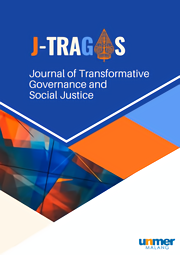Fostering Community Resilience through Social Capital
DOI:
https://doi.org/10.26905/j-tragos.v1i1.9229Keywords:
Literature Review, Resilience, Social CapitalAbstract
An experienced and resilient community has become a much-studied discourse after COVID-19. Strengthening the ability to self-organize post-crisis events encountered difficulties around changing local risk perspectives. In addition, they are increasing the capacity of individuals as a whole to form the expected community resilience. This study explains the importance of leveraging social capital to increase community capacity, affecting the ability to survive future crises. This study used a literature review to explore prior conceptions and conclusions about fostering community resilience and essential agreement of social capital. In this research, we seek a contribution through the following arguments a) Community resilience is the outcome of reciprocity social relationships; b) Social capital is an endeavor to cultivate relationships that encourage shared-value advantages between community members; c) Intellectual capital is the valuable sources in representing action-based of knowledge. The result shows it is necessary to build community resilience through a robust social approach, maintaining and reconstructing social capital to present community advantage and shared-value embedded in each community member.
Downloads
References
Bento, F., & Couto, K. C. (2021). A behavioral perspective on community resilience during the covid-19 pandemic: The case of paraisópolis in são paulo, brazil. Sustainability (Switzerland), 13(3), 1–18. https://doi.org/10.3390/su13031447
Carter, E. D., & Cordero, M. L. (2022). Salir Adelante: Social capital and resilience during the Covid-19 pandemic in Argentina. Health and Place, 77. https://doi.org/10.1016/j.healthplace.2022.102870
Cavaye, J., & Ross, H. (2019). Community resilience and community development: What mutual opportunities arise from interactions between the two concepts? Community Development, 50(2), 181–200. https://doi.org/10.1080/15575330.2019.1572634
Chaskin, R. J. (2008). Resilience, community, and resilient communities: Conditioning contexts and collective action. Child Care in Practice, 14(1), 65–74. https://doi.org/10.1080/13575270701733724
Cohen, O., Goldberg, A., Lahad, M., & Aharonson-Daniel, L. (2017). Building resilience: The relationship between information provided by municipal authorities during emergency situations and community resilience. Technological Forecasting and Social Change, 121, 119–125. https://doi.org/10.1016/j.techfore.2016.11.008
Faulkner, L., Brown, K., & Quinn, T. (2018). Analyzing community resilience as an emergent property of dynamic social-ecological systems. Ecology and Society, 23(1). https://doi.org/10.5751/ES-09784-230124
Folke, C., Carpenter, S. R., Walker, B., Scheffer, M., Chapin, T., & Rockström, J. (2010). Resilience thinking: Integrating resilience, adaptability and transformability. Ecology and Society, 15(4). https://doi.org/10.5751/ES-03610-150420
Holling, C. S. (1973). Resilience and Stability of Ecological Systems. Annu.Rev.Ecol.Syst., 4, 1–23.
Jewett, R. L., Mah, S. M., Howell, N., & Larsen, M. M. (2021). Social Cohesion and Community Resilience During COVID-19 and Pandemics: A Rapid Scoping Review to Inform the United Nations Research Roadmap for COVID-19 Recovery. International Journal of Health Services, 51(3), 325–336. https://doi.org/10.1177/0020731421997092
Mayer, B. (2019). A Review of the Literature on Community Resilience and Disaster Recovery. Current Environmental Health Reports, 6(3), 167–173. https://doi.org/10.1007/s40572-019-00239-3
Musavengane, R., & Kloppers, R. (2020). Social capital: An investment towards community resilience in the collaborative natural resources management of community-based tourism schemes. Tourism Management Perspectives, 34(February), 100654. https://doi.org/10.1016/j.tmp.2020.100654
Nahapiet, J., & Ghoshal, S. (1998). Social Capital, Intellectual Capital, and the Organizational Advantage. The Academy of Management Review, 23(2), 242–266. https://doi.org/https://doi.org/10.2307/259373
Schwade, F., & Schubert, P. (2021). Social Collaboration Analytics for Enterprise Social Software: A Literature Review. https://www.researchgate.net/publication/323639521
Skerratt, S. (2013). Enhancing the analysis of rural community resilience: Evidence from community land ownership. Journal of Rural Studies, 31, 36–46. https://doi.org/10.1016/j.jrurstud.2013.02.003
South, J., Stansfield, J., Amlôt, R., & Weston, D. (2020). Sustaining and strengthening community resilience throughout the COVID-19 pandemic and beyond. In Perspectives in Public Health (Vol. 140, Issue 6, pp. 305–308). SAGE Publications Ltd. https://doi.org/10.1177/1757913920949582
Faulkner, L., Brown, K., & Quinn, T. (2018). Analyzing community resilience as an emergent property of dynamic social-ecological systems. Ecology and Society, 23(1). https://doi.org/10.5751/ES-09784-230124
Folke, C., Carpenter, S. R., Walker, B., Scheffer, M., Chapin, T., & Rockström, J. (2010). Resilience thinking: Integrating resilience, adaptability and transformability. Ecology and Society, 15(4). https://doi.org/10.5751/ES-03610-150420
Ma, Z., Guo, S., Deng, X., & Xu, D. (2021). Community Resilience and Resident’s Disaster Preparedness: Evidence From China’s Earthquake-Stricken Areas. Natural Hazards, 108(1), 567–591. https://doi.org/10.1007/s11069-021-04695-9
Qiang, Y., Huang, Q., & Xu, J. (2020). Observing community resilience from space: Using nighttime lights to model economic disturbance and recovery pattern in natural disaster. Sustainable Cities and Society, 57(September 2019), 102115. https://doi.org/10.1016/j.scs.2020.102115
Rapaport, C., Hornik-Lurie, T., Cohen, O., Lahad, M., Leykin, D., & Aharonson-Daniel, L. (2018). The relationship between community type and community resilience. International Journal of Disaster Risk Reduction, 31(February), 470–477. https://doi.org/10.1016/j.ijdrr.2018.05.020
Sumardi, L., & Wahyudiati, D. (2021). Using Local Wisdom to Foster Community Resilience During the Covid-19 Pandemic: A Study in the Sasak Community, Indonesia. Proceedings of the 2nd Annual Conference on Education and Social Science (ACCESS 2020), 556(Access 2020), 122–127. https://doi.org/10.2991/assehr.k.210525.059
Yang, E., Kim, J., Pennington-Gray, L., & Ash, K. (2021). Does tourism matter in measuring community resilience? Annals of Tourism Research, 89, 103222. https://doi.org/10.1016/j.annals.2021.103222
Yip, W., Ge, L., Ho, A. H. Y., Heng, B. H., & Tan, W. S. (2021). Building community resilience beyond COVID-19: The Singapore way. The Lancet Regional Health - Western Pacific, 7. https://doi.org/10.1016/j.lanwpc.2020.100091
Downloads
Additional Files
Published
How to Cite
Issue
Section
License
Authors who publish in this journal agree to the following terms:
(1) Copyright of the published articles will be transferred to the journal as the publisher of the manuscripts. Therefore, the author confirms that the copyright has been managed by the journal.
(2) Publisher of the Journal of Transformative Governance and Social Justice (J-TRAGOS) is the University of Merdeka Malang.
(3) The copyright follows Creative Commons Attribution “ShareAlike License (CC BY SA): This license allows to Share” copy and redistribute the material in any medium or format, Adapt” remix, transform, and build upon the material, for any purpose, even commercially.




